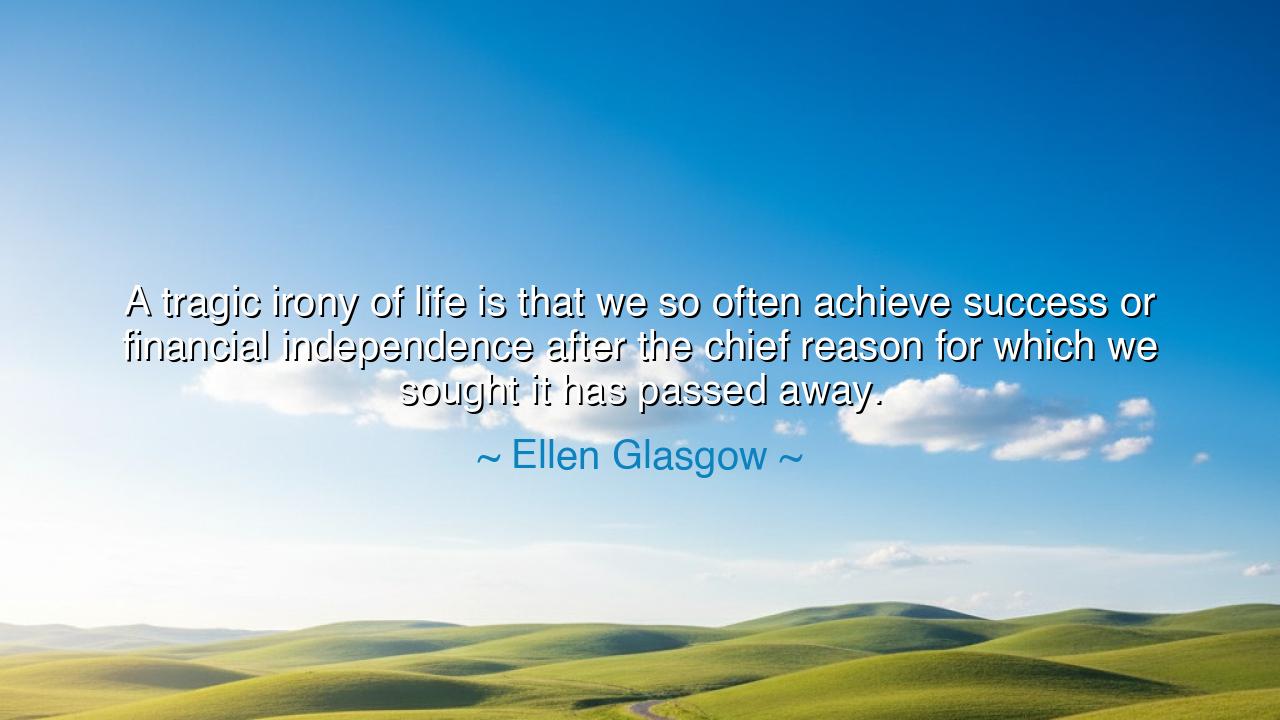
A tragic irony of life is that we so often achieve success or
A tragic irony of life is that we so often achieve success or financial independence after the chief reason for which we sought it has passed away.






Hear, O children of wisdom, the mournful truth spoken by Ellen Glasgow: "A tragic irony of life is that we so often achieve success or financial independence after the chief reason for which we sought it has passed away." These words, filled with the bittersweet realization of human experience, point to a truth that all must understand—how often we chase after what we believe will bring us happiness or fulfillment, only to find that the thing we sought has already slipped beyond our grasp by the time we attain it.
Success and financial independence are powerful desires, motivating many throughout their lives. They are often seen as the key to freedom, the markers of a life well-lived. We work tirelessly, often sacrificing time, relationships, and even our own well-being, believing that once we achieve these goals, we will find happiness, peace, and security. But Glasgow reveals the irony of this pursuit: we may achieve all that we thought we needed, only to discover that the very reasons we sought them have faded away. Success, it seems, is not always the path to happiness we imagine it to be. The fruits of our labor may be sweet, but the sweetness is often felt too late, when those we sought to impress or please have already moved on, or when the world we worked for no longer holds the same meaning.
Consider the life of King Midas, the ancient ruler who was granted the gift of turning everything he touched into gold. Midas sought wealth, believing it would bring him the security and fulfillment he craved. Yet, in the end, his success became his tragedy—he turned his beloved daughter into gold, losing the one thing that mattered most to him. The irony of Midas’s story is that, in his pursuit of wealth, he lost everything that gave his life meaning. Glasgow's words echo this ancient tale: we often pursue financial independence or success believing they will bring us the things we cherish, but when we finally grasp them, we find that those things—like the love of family or the joy of simple moments—are no longer present.
Consider also the story of Alexander the Great, whose conquests led him to the farthest reaches of the known world. Alexander, a man driven by the desire for glory and dominance, sought to create a legacy of success and power that would endure forever. And yet, by the time he had achieved what others only dreamed of, he found himself unfulfilled, weary, and estranged from the very people he had hoped to inspire. Alexander’s death, just after he had attained the pinnacle of power, is a stark reminder of Glasgow's reflection. He had achieved everything he sought, but by then, the very reasons he had desired them—his yearning for immortality, for recognition, for purpose—had already lost their hold on him. He passed away too soon to truly enjoy the fruits of his labor.
Glasgow’s words hold a mirror to the human experience, showing us that the pursuit of success often blinds us to the fleeting nature of time. We may toil for years, chasing after financial independence and worldly recognition, believing that these will solve our problems and bring us lasting happiness. Yet, by the time we reach that coveted goal, we may find that the very desires that motivated us have either changed or disappeared. What we thought we wanted is no longer the thing that brings us peace. Success, when pursued at the expense of all else, can become an empty achievement, a reward that no longer holds meaning when the things that truly matter are no longer within our reach.
The lesson here, O children, is that the pursuit of success and independence should never come at the expense of what is truly valuable—our relationships, our health, and the joy of living in the present. Financial independence and success are important, but they must not be the sole purpose of life. In the words of Glasgow, we must be cautious in our ambitions, for often the very things we strive for may not bring the fulfillment we seek. True fulfillment comes not from the accumulation of wealth or the achievement of external goals, but from living a life of balance, of cherishing what we have along the way, and of remembering that success without meaning or love is ultimately hollow.
Therefore, O children, let us strive for success, but not at the cost of living fully. Let us be mindful of the irony that Glasgow speaks of, and remember that true happiness lies not in what we gain, but in how we live, the relationships we build, and the moments we cherish. Success and independence are worthy goals, but they must be sought with wisdom, with the understanding that life is fleeting, and what we truly need may already be before us. Seek not to achieve only for the sake of achievement, but to live with purpose, knowing that the path is as important as the destination.






AAdministratorAdministrator
Welcome, honored guests. Please leave a comment, we will respond soon